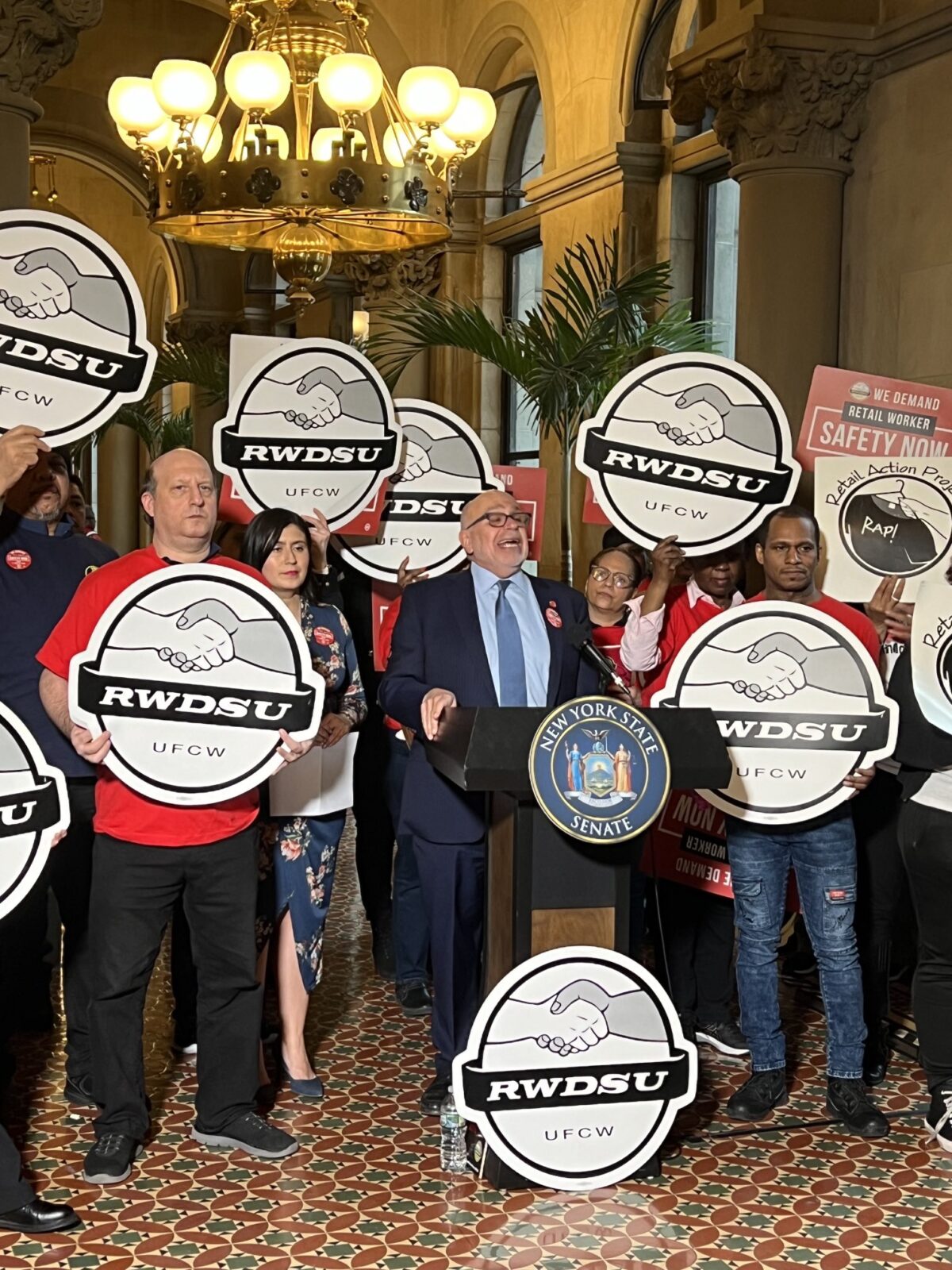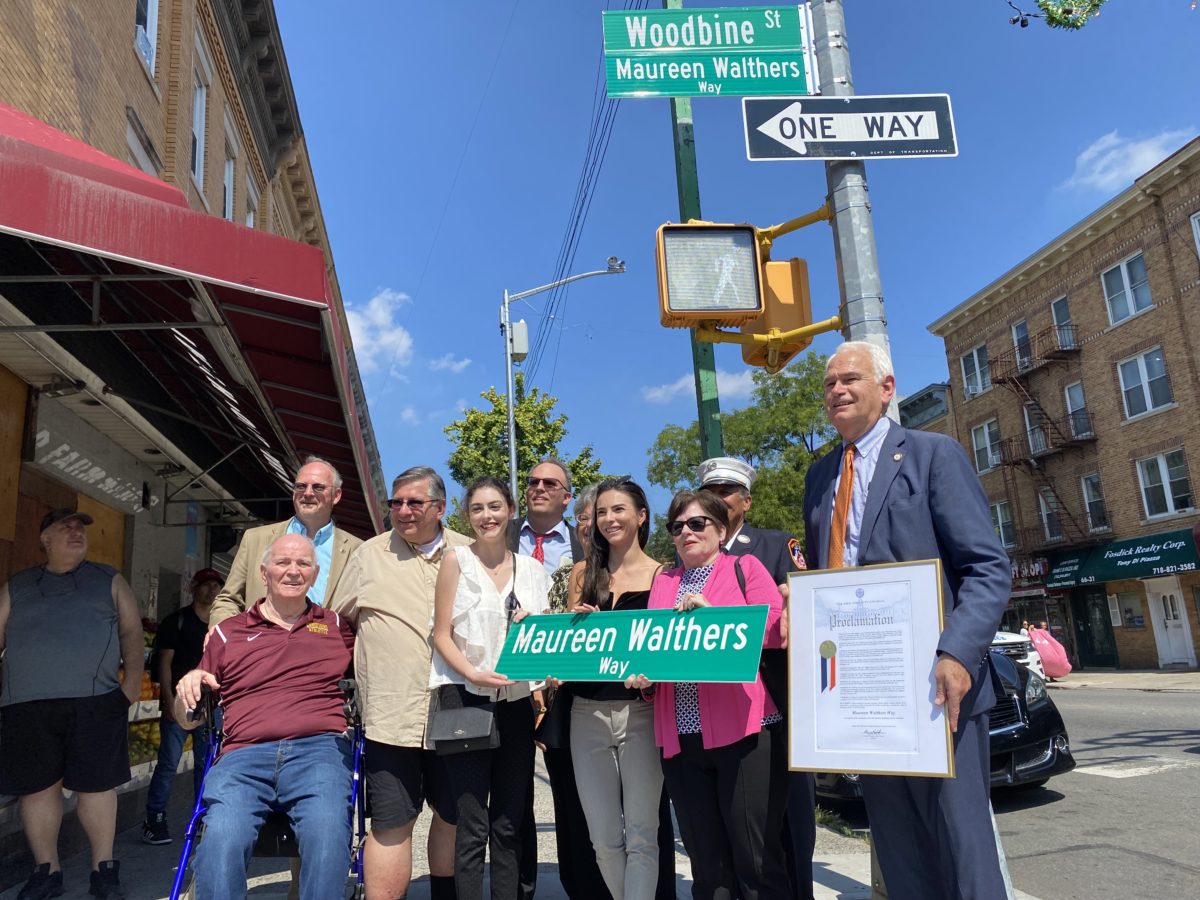Two weekends ago, Councilman Bob Holden honored the late, great Maureen Walthers, the long-time matriarch of the Ridgewood Times, with a street co-naming on Woodbine Street in Ridgewood, where she called home.
Walthers served as the first female editor of the Ridgewood Times, as well as its executive vice president and co-owner.
She went on to purchase the paper in 1983, and eventually launched the Times Newsweekly, extending to other parts of Queens.
Her contributions to the neighborhood also include her involvement in Community Board 5 and Greater Ridgewood Restoration Corporation, her efforts to preserve and landmark the Onderdonk House and co-founding the Greater Ridgewood Historical Society — among many other commendable endeavors.
Walthers passed away in 2020 after an illness, and dozens of people gathered on Aug. 27 to celebrate her work as a journalist and civic leader, and reminisce on her kind, witty personality.
But what should have been a wholesome event to commemorate her life and legacy quickly turned sour when speakers on the mic made strange, competitive remarks pitting the Ridgewood Times and other local papers against each other.
“The Ridgewood Times at that time was the newspaper. The layout of the Ridgewood Times was again, the most complete, the most professional, and it rivaled actually many, many daily newspapers,” Holden said.
Sheesh, Bob. That’s a perfectly fine opinion to have, but to say it on the mic in front of a crowd of people, which included reporters from said papers, is a bit awkward.
Many of Walthers’ close friends and loved ones took turns on the mic to reminisce. The comments got weirder as the ceremony went on.
Outgoing Assemblywoman Cathy Nolan said that local journalism should be about what Walthers exemplified: “fearless, fun and community-focused,” and that although other papers “try,” she misses what Walthers brought to the table.
Another community resident who’s known Walthers since the ‘70s even went as far as suggesting that other local papers misrepresent people and events, and the Ridgewood Times always got it right.
“Any time you wanted to put something in [the Ridgewood Times], *boom* it was in. And it was always put in a great light,” he said. “Those of you who might’ve been portrayed in other papers or in other media and say, ‘That’s not really what happened,’ but with the Ridgewood Times, it really was what happened.”
News flash: it is not a journalist’s job to portray people and events in a “positive light,” it’s our job to seek the truth — the good, the bad and the ugly — and report it to our readers.
Any journalist worth their title will promptly make a correction or retraction if something was somehow taken out of context or misinterpreted in any way. Reach out to us and start a dialogue if that’s ever the case.
The Ridgewood Times has done and continues to do admirable work for the community, and Maureen Walthers’ work in the newspaper business serves as inspiration for all young reporters, especially young women.
But for elected officials and community leaders to make her event a competition is a blatant slap in the face to reporters at other newspapers who work tirelessly to provide readers with relevant local news.
In the same way that politicians represent a community whether people like it or not, established local newspapers influence and serve thousands of readers in the community — whether politicians like it or not.
We should all aim to work together to provide the most factual, up-to-date news to our communities.
The remainder of Walthers’ street co-naming event was lovely, revealing fond memories of her along with a shiny new street sign that reads, “Maureen Walthers Way.”
Based on Maureen’s personality and life philosophy, she wouldn’t have appreciated the needless, subtle digs at other papers. We knew her well. She was a true pioneer in our industry and she believed as we do, in the growth and prosperity of our communities. Local papers are a strength of the neighborhood.
Her work at the Ridgewood Times speaks for itself.











